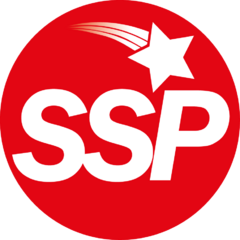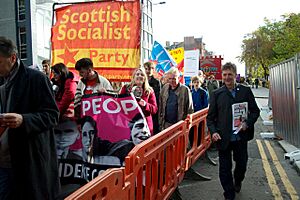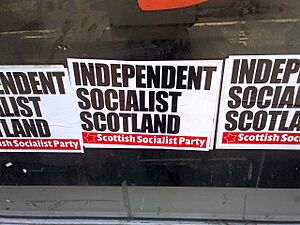Scottish Socialist Party facts for kids
Quick facts for kids
Scottish Socialist Party
|
|
|---|---|
 |
|
| Abbreviation | SSP |
| Chairperson | Christine McVicar |
| Secretary | Bill Bonnar |
| Spokesperson | Colin Fox Natalie Reid |
| Workplace Organiser |
Richie Venton |
| Founded | 1998 |
| Merger of | Scottish Socialist Alliance Scottish Militant Labour |
| Headquarters | Suite 370 Central Chambers 93 Hope Street Glasgow G2 6LD |
| Newspaper | Scottish Socialist Voice |
| Ideology |
|
| Political position | Left-wing |
| Colours | Red, white, and yellow |
| Scottish Parliament |
0 / 129
|
| Local government in Scotland |
0 / 1,227
|
The Scottish Socialist Party (SSP) is a left-wing political party in Scotland. It believes in socialism, which means the economy should be run for the benefit of everyone, not just for profit. The party's main goal is to create an independent republic of Scotland. A republic is a country without a king or queen.
The SSP was formed in 1998. It campaigns for Scottish independence, fights against cuts to public services like schools and hospitals, and wants important parts of the economy to be owned by the public. The party was a key part of Yes Scotland, the main group that campaigned for independence in the 2014 referendum.
The party has local branches across Scotland and publishes a newspaper called the Scottish Socialist Voice. In 2003, the SSP was at its most successful, with six Members of the Scottish Parliament (MSPs). Since 2017, it has not had any MSPs or local councillors.
Contents
How the Party is Run
The SSP is a democratic party, which means its members make the big decisions. The party is led by two national co-spokespersons, Colin Fox and Natalie Reid.
Key decisions are made in several ways:
- National Conference: This is a big meeting held once a year where members vote on the party's main policies.
- National Council: This group meets four times a year to discuss ongoing issues.
- Executive Committee: This small group handles the party's day-to-day work and is elected by the members.
History of the SSP
A Strong Start
The Scottish Socialist Party was created in 1998 from a group of other left-wing organisations called the Scottish Socialist Alliance. In the first Scottish Parliament election in 1999, its leader, Tommy Sheridan, was elected as an MSP for Glasgow.
After this success, the party grew quickly. The RMT, a large trade union for transport workers, joined in support of the SSP. In the Scottish Parliament, the party worked on laws to help people in debt and to introduce free school meals. They also wanted to replace the council tax with a fairer tax based on how much people earn.
In the 2003 election, the SSP did even better, winning six seats in the Scottish Parliament.
Leadership Changes and Challenges
On 11 November 2004, Tommy Sheridan resigned as the party's leader for personal reasons. Colin Fox, an MSP for the Lothian region, was elected as the new leader in 2005.
After 2007, the SSP lost its seats in the Scottish Parliament and has not won any since. However, the party continued to campaign and take part in elections. They focused on ideas like taxing the rich to pay for public services and making sure ordinary people were not punished for economic problems.
The 2014 Independence Referendum
When the Scottish Government announced there would be a referendum on Scottish independence, the SSP joined the official "Yes Scotland" campaign. The party's spokesperson, Colin Fox, was on the campaign's advisory board.
The SSP argued that independence was a chance to create a fairer, socialist Scotland. In 2013, they published a popular pamphlet called The Case for an Independent Socialist Scotland. They held many public meetings across the country to share their ideas.
Colin Fox said the SSP brought the voice of working-class people to the independence debate. He believed the most important issue for voters was whether independence would make their lives better.
After the Referendum
After Scotland voted to remain in the United Kingdom, the SSP, like other pro-independence parties, saw its membership grow. The party continued to campaign on its core issues.
For the 2016 Scottish Parliament election, the SSP joined with other left-wing groups to form an alliance called RISE – Scotland's Left Alliance. However, the alliance did not win any seats. After this, the SSP decided to focus on building its own support again.
The party did not stand in the 2017 or 2019 UK general elections, or the 2021 Scottish Parliament election.
Return to Elections
The SSP began to stand in elections again, starting with the 2022 Scottish local elections. Their campaign focused on scrapping the council tax and bringing in an income-based tax instead. They also called for building more public housing and returning energy companies to public ownership.
The party stood candidates in the 2023 Rutherglen and Hamilton West by-election and the 2024 United Kingdom general election. In 2025, the party announced it would stand candidates in the 2026 Scottish Parliament election, marking its return to national elections.
What the SSP Believes In
The SSP has a range of policies based on its socialist, pro-independence, and republican values.
Scottish Independence
The SSP is a strong supporter of Scottish independence. The party believes an independent Scotland should be a republic, meaning it would have an elected head of state instead of a monarch. They also want an independent Scotland to be free of nuclear weapons.
The party's vision for independence is based on internationalism, not nationalism. This means they want to build a welcoming and inclusive country for everyone who lives in Scotland, including asylum seekers. Their ideas are inspired by the Scottish socialist John Maclean, who also combined socialism with the goal of an independent Scotland.
Europe
The SSP supports Scotland being a member of the European Union. However, the party is critical of the EU, calling it an "undemocratic, capitalist institution" that often helps big businesses more than workers.
The party's goal is to work with other socialist groups across Europe to create a "socialist federation of European nations." In the 2016 Brexit referendum, the SSP campaigned for the UK to remain in the EU, while also calling for major changes to make Europe fairer for everyone.
Fairer Taxes
The SSP wants to get rid of the council tax. This is the tax people pay to their local council, and it is based on the value of their home. The SSP argues this is unfair, especially for renters and pensioners.
Instead, they propose a "Scottish Service Tax" based on a person's income. Under their plan, people with lower incomes would pay less tax, or no tax at all, while those with higher incomes would pay more. This idea has been supported by many people in Scotland, but it has not yet been made into law.
Free School Meals
The SSP has long campaigned for all children in Scotland to receive free, healthy school meals. They believe this would end the stigma for children who get free meals now and would help tackle health problems like obesity.
An SSP member of parliament, Frances Curran, introduced a bill for this in 2002. Although it was defeated, the campaign raised awareness of the issue. The Scottish National Party later introduced free school meals for all children in Primary 1 to 3, and the SSP continues to campaign for the policy to be extended to all pupils.
Public Transport
The SSP wants to make all public transport in Scotland free. They argue this would cut down on traffic, reduce air pollution, and help people on low incomes. The money to pay for this would come from funds currently planned for building new roads.
The party points to cities like Tallinn in Estonia and the country of Luxembourg, which have successfully introduced free public transport. They also want to bring Scotland's buses and trains back into public ownership.
Healthcare
In 2005, SSP MSP Colin Fox proposed a bill to get rid of prescription charges in Scotland. At the time, other parties voted against it. However, the campaign helped push the issue, and prescription charges were finally abolished in Scotland in 2011.
The party also calls for a new National Care Service, which would be publicly owned and free, just like the NHS. They believe this would improve the quality of care for the elderly and disabled, and provide better pay and conditions for care workers.
Electoral Performance
Scottish Parliament
| Election | No. of 2nd votes | % of 2nd vote | No. of overall seats won | +/− | Position | Notes |
|---|---|---|---|---|---|---|
| 1999 | 46,635 | 2.0 (7th) |
1 / 129
|
N/A | 5th | |
| 2003 | 128,026 | 6.7 (6th) |
6 / 129
|
6th | ||
| 2007 | 12,731 | 0.6 (13th) |
0 / 129
|
N/A | ||
| 2011 | 8,272 | 0.4 (12th) |
0 / 129
|
N/A | ||
| 2016 | 10,911 | 0.5 (9th) |
0 / 129
|
N/A | Stood as RISE – Scotland's Left Alliance | |
| 2021 | N/A | N/A | N/A | Did not stand any candidates | N/A |
United Kingdom Parliament
| Election | No. of candidates | No. of votes | % of vote | Notes |
|---|---|---|---|---|
| 2001 | 72 | 72,516 | 3.1 (5th) | |
| 2005 | 58 | 43,514 | 1.9 (5th) | |
| 2010 | 10 | 3,157 | 0.1 (9th) | |
| 2015 | 4 | 895 | 0.03 (10th) | Chose to stand in small number of seats after electoral alliance talks failed |
| 2017 | N/A | N/A | N/A | Did not stand any candidates |
| 2019 | N/A | N/A | N/A | Did not stand any candidates |
| 2024 | 2 | 1,007 |
See also
 In Spanish: Partido Socialista Escocés para niños
In Spanish: Partido Socialista Escocés para niños
- List of Scottish Socialist Party members of the Scottish Parliament
- List of advocates of republicanism in the United Kingdom
- List of political parties in the United Kingdom opposed to austerity
- Radical Independence Campaign
 | May Edward Chinn |
 | Rebecca Cole |
 | Alexa Canady |
 | Dorothy Lavinia Brown |




